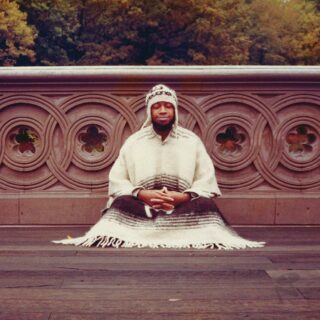Laraaji
Segue To Infinity
8/10

8/10
New Age music has gone through a major reputation reboot in the last decade or so. For a long time, it was derided as purposely toothless man-made whalesong replication, made to accompany the self-absorbed scenes that emerged as the communal hippie dream of the ’60s curdled into cod-spiritual navel-gazing – and that’s not how it’s viewed any more.
Compilations of vintage cuts (notably Light In The Attic’s I Am The Center) have evidenced the artistic potential of meditative cosmic drifting. Likeminded contemporary artists have underlined the close alignment between becalmed branches of modern electronic music and the ambient soundscapes of New Age. Laraaji – one of the genre’s seminal cult heroes – has been at the forefront of this revival.
Born Edward Larry Gordon, Laraaji studied composition and worked with the likes of Larry Mizell and Marvin Gaye before exchanging a guitar for an autoharp/zither (a 36-string traditional American folk instrument). Influenced by a keen interest in Eastern mysticism, the result was the open-tuned, blissfully rippling extemporizations that populate Segue to Infinity. The four-LP set combines 1978 debut Celestial Vibration (a perfectly apt description for Laraaji’s trance-inducing MO) with six side-long explorations from the same period, prior to Laraaji being spotted playing on the streets of New York by Brian Eno (who promptly invited him to record 1980’s Ambient 3: Day Of Radiance), drawn from long-lost acetates spotted for sale on eBay.
Segue to Infinity is essentially mood music, in the most literal meaning of the phrase. If one were to approach it in a mood for action, sudden movements and drama, and the slow-burningly stationary proceedings are likely to frustrate with their unhurried glide, with the same reverberating harp-like open chords repeating endlessly across a vast blank canvas. Go in with differently tuned ears, and alluringly hypnotic depths soon emerge from Laraaji’s deliberately restricted toolkit. The serene ‘Ocean’ has a gentle push and pull akin to waves lapping on a deserted beach during a particularly pretty sunset, while ‘Koto’ adds motifs from East Asian folk music to its rattling drones. Best of all is ‘Segue to Infinity’: as Laraaji’s rippling zither and an unknown flautist (recorded so closely you hear every breath) embark on an extended gentle joust for the spotlight, the track cultivates the same beauteous ebb and flow as the finest workouts of jazz musicians a la Alice Coltrane and Pharoah Sanders, musicians on a different stylistic path but sharing the same spiritually questing aims.